Table of Contents
RECENTLY ARMED FORCES (SPECIAL POWERS) ACT
• What does the AFSPA mean?
• In simple terms, AFSPA gives armed forces the power to maintain public
order in “disturbed areas”.
• They have the authority to prohibit a gathering of five or more persons in an area, can use force or even open fire after giving due warning if they feel a person is in contravention of the law.
• If reasonable suspicion exists, the army can also arrest a person without a warrant; enter or search a premises without a warrant; and ban the possession of firearms.
HISTORICAL BACKGROUND
• The AFSPA was first enacted as an ordinance in the backdrop of Quit India Movement launched by Mahatma Gandhi in 1942.
• A day after its launch on August 8, 1942, the movement became leaderless and turned violent at many places across the country. Leaders like Mahatma Gandhi, Jawaharlal Nehru,
VB Patel and a host of others had been put behind the bars.
• Shaken by the massive scale of violence across the country, the then Viceroy Linlithgow promulgated the Armed Forces (Special Powers) Ordinance, 1942.
WHAT’S THE ORIGIN OF AFSPA?
• The Act came into force in the context of increasing violence in the Northeastern States decades ago, which the State governments found difficult to control.
• The Armed Forces (Special Powers) Bill was passed by both the Houses of Parliament and it was approved by the President on September 11, 1958. It became known as the Armed Forces
Special Powers Act, 1958.
MCQ
With reference to Armed Forces Special powers Act (AFSPA), who among the following can declare an area as ‘disturbed area’?
1. Governor
2. Chief Minister
3. Central Government
Select the correct answer using the codes given below.
a) 1 and 3 only
b) 1 and 2 only
c) 2 and 3 only
d) All of them
ANSWER
• Governor of a State and the Central Government are empowered to declare any part or full of any state as a disturbed area if according to their opinion that it has become necessary to disrupt terrorist activity or any such activity that might impinge on the sovereignty of India or cause insult to the national flag, anthem or India’s Constitution.
WHY NEED AFSPA
•Infrastructural Factors: NER has about 6 % of the national roads and about 13 % of the national
highways, quality is not good.
INSURGENCY IN NORTHEAST INDIA
• The United Liberation Front of Assam was formed in April 1979 to establish a sovereign state of Assam through armed struggle. In recent times the organisation has lost its middle
rung leaders after most of them were arrested.
• The National Democratic Front of Bodoland was formed in 1989 as the Bodo Security Force, and aims to set up an independent country Bodoland.
WHAT IS DISTURBED AREAS ACT (DAA)?
• The Assam Disturbed Areas Act was initially promulgated for Nagaland in 1955 to supress the Naga uprising. This act is called the mini AFSPA since it provides the same powers to the
armed forces as in AFSPA.
• The state government has got the power to declare the whole or any part of the district by notification in the Official Gazette as a disturbed area.
• Many states including the Jammu and Kashmir have repealed the Disturbed areas Act and brought in the AFSPA.
NOTES
• The Armed Forces (Punjab and Chandigarh) Special Powers Act, 1983
• The Armed Forces (Jammu and Kashmir) Special Powers Act, 1990
HUMAN RIGHTS
• Violations of the Constitution and International Conventions due to the enactment of the AFSPA.
1. Sec 4(a) in which army can shoot to kill violates article 21 which gives right to life.
2. Section 4(b) search without warrants violates right to liberty and article 22.
3. Dispersion of civil assembly by armed forces under section 121 violates right to assembly
4. No judicial magistrate permission required while arresting – violate article 22.
AFSPA VIOLATES VARIOUS INTERNATIONAL CONVENTIONS SUCH AS THE:
• Universal Declaration of Human rights (UDHR),
• International Covenant on Civil and Political Rights (ICCPR)
• Convention against Torture
• UN Code of Conduct for Law Enforcement Officials,
• The UN Body of Principles for Protection of All Persons
Under Any Form of Detention,
• The UN Principles on Effective Prevention and Investigation of Extra-Legal, Arbitrary and Summary Executions.
IROM CHANU SHARMILA
• 16 years of fasting.
• On 26 July 2016, Irom Sharmila, who had been on a hunger strike since 2000, announced that she would end her fast on 9 August 2016. She also announced that she would contest state
elections in Manipur.
























 WhatsApp
WhatsApp